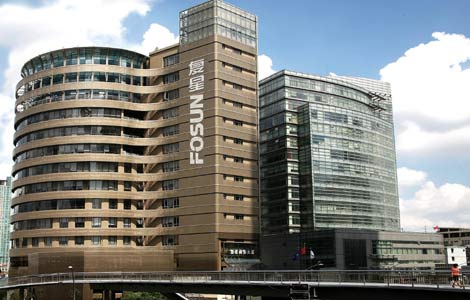Company chief in Shanghai fills every waking hour with business interests
Liang Xinjun, chief executive officer of Chinese private conglomerate Fosun Group, is a man full of energy.
He seemingly fills every hour of the waking day with work.
The busiest time for Liang to send or reply to emails is between 1 and 2 am. At 6 am he is back online, sending or replying again.
|
 |
|
The headquarters of Fosun Group in Shanghai. [Photo / China Daily] |
If he takes a business trip abroad, he will attend the meeting straightaway rather than deal with jet lag.
He likes to read books about the different development stages of companies. Currently, he is reading books about insurance because he believes that to be a world-class investment group focusing on Chinese growth, insurance funds can play an important role.
Fosun set up a $600 million private equity fund with Pramerica Financial - a brand name used by US Prudential Financial Inc and its affiliates in select countries outside the United States.
"We have paid attention to developing our investment business since 2009 and have attached importance to managing PE (private equity) funds since 2011. We are positively seeking insurance funds for our future development," Liang told China Daily.
Fosun was founded in 1992 by four graduates of Shanghai's Fudan University, including genetic engineering student Liang and philosophy student Guo Guangchang - now the chairman of Fosun. When Fosun International Ltd, the parent company of Fosun Group, was listed in 2007 in Hong Kong, its four key businesses were pharmaceuticals, property, steel and mining.
According to Liang, Fosun only had industrial businesses in 2007 and was regarded as an industry company with diversified businesses, so valuations of Fosun at that time were based on the market conditions of the property and steel sectors.
"Our performance in industrial businesses is good. Over the past seven years, our compound annual growth rate was 27 percent and year-on-year growth was 19 percent last year," said Liang, adding that the businesses in the four sectors have provided the company with steady profits and dividends. Furthermore, they contributed to building a foundation for Fosun's investment business.
"An investor should be capable of using its industry capability to help the companies it invests in to develop their businesses. Buying in outside expertise is expensive," Liang said.
"We started our investment business in 2009 and the growth is fast. Our dividend and exit return on the investment business in 2011 totaled about 4 billion yuan ($632 million). It was about 2 billion yuan in 2010."
Fosun International's 2011 performance report showed the company's aggregate dividend and exit return on investment business (including the PE business) was 7.67 billion yuan in 2011. In 2010 it was 3.79 billion yuan and in 2009 it was 1.77 billion yuan.
"Because our strong investment capability can conduct more investments and we do not want to increase our debts, we turned to focus more on developing the PE business in 2011," said Liang.
By the end of 2011, Fosun had managed six PE funds totaling 13.3 billion yuan, of which 2.7 billion yuan came from Fosun itself. One fund of $100 million was in cooperation with Carlyle Group LP.
The yearly profit of Fosun's asset management (almost all PE) business was 121 million yuan last year and 15 investment deals were made totaling 5.16 billion yuan.
Seven companies invested in by Fosun were listed last year, including Shanghai Ganglian E-Commerce Co Ltd, Henan Billions Chemicals Co Ltd and Shenzhen Jasic Technology Co Ltd.
Shanghai Ganglian E-Commerce Co Ltd is an integrated IT service provider specializing in supplying steel information services, network technology and e-commerce services. Fosun invested 44 million yuan in the company in 2007 and held a stake of 52.9 percent because it considered industrial upgrading as one of the promising industries in the near future, according to Liang.
